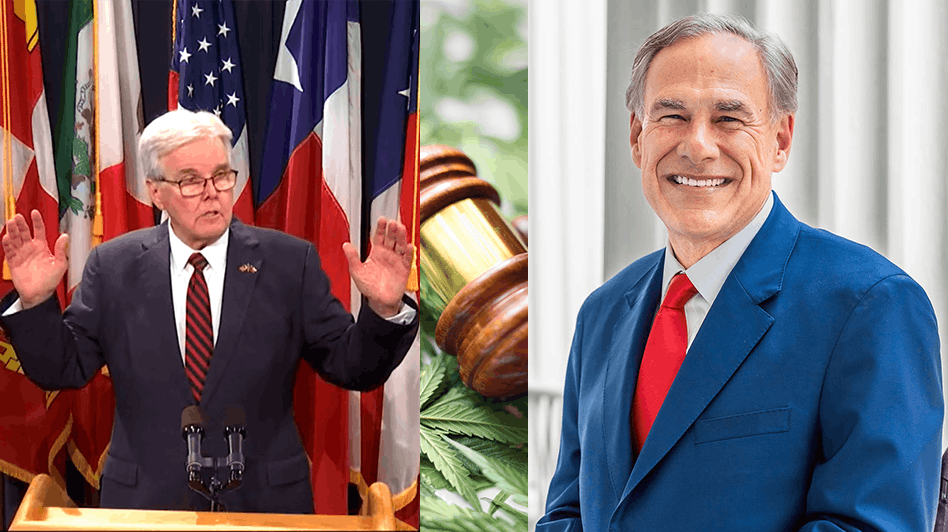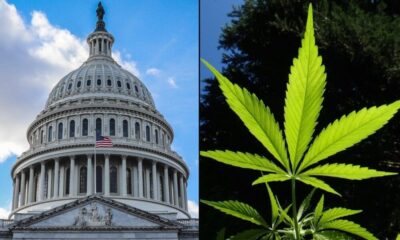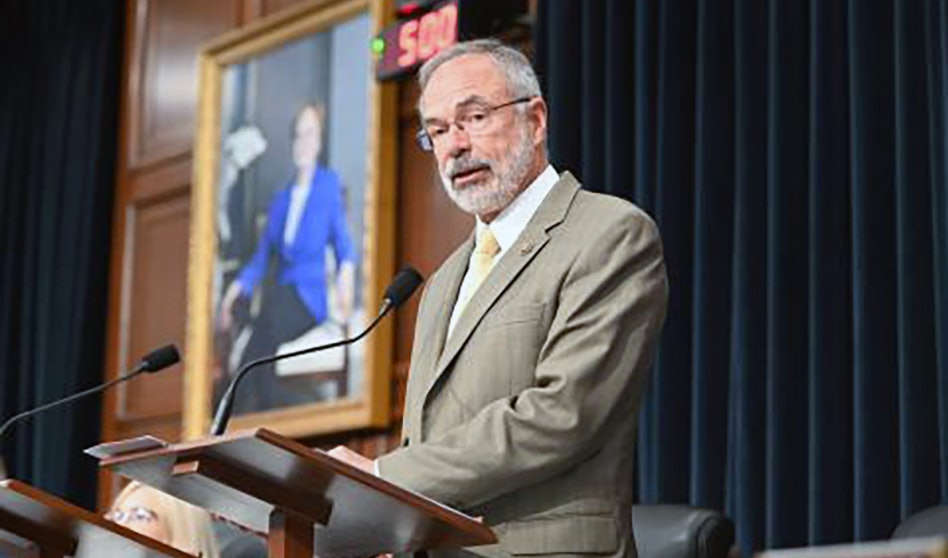featured
Circuit Court Ruling for Arkansas Renders Texas Governor’s Hemp Veto Argument Moot
Published
5 hours agoon

A federal court vacated a preliminary injunction on June 24 that had been blocking Arkansas from implementing a ban on certain hemp-derived cannabinoids, including delta-8 THC, for the past two years.
Arkansas Gov. Sarah Huckabee Sanders signed Senate Bill 358 (Act 629) into law in April 2023, legislation to prohibit intoxicating hemp-derived cannabinoids by classifying a list of tetrahydrocannabinols as Schedule VI substances in the state. That list included delta-8, delta-9 and delat-10 THC, among other compounds.
The intent of the Arkansas General Assembly and Sanders was to stop the production and sale of intoxicating substances derived from federally compliant industrial hemp, as defined under the 2018 Farm Bill. State lawmakers and the governor specifically had concerns with products derived from industrial hemp that were produced as a result of a synthetic chemical process.
While Act 629 took effect in August 2023, U.S. District Judge Billy Roy Wilson placed a preliminary injunction on its implementation five weeks later after a quartet of cannabis-related businesses filed a lawsuit claiming that the ban violates the U.S. Constitution’s Supremacy, Due Process, Takings and Commerce clauses.
The plaintiff businesses include Bio Gen LLC, Drippers Vape Shop LLC, Cigarette Store LLC (d/b/a Smoker Friendly) and Sky Marketing Corp. (d/b/a Hometown Hero)—collectively, “Bio Gen.”
Wilson also denied a motion to dismiss that Sanders, Attorney General Tim Griffin and other Arkansas officials filed in the Eastern District Court. In part, the district court judge ruled that Bio Gen would likely succeed on the merits of its Supremacy Clause claim because the 2018 Farm Bill likely preempted Act 629.
However, the U.S. Court of Appeals for the Eighth Circuit reversed the lower court’s ruling this week, dealing a victory to the Arkansas officials.
“The text of the 2018 Farm Bill shows only that Congress wanted to facilitate state legalization of hemp, if a state wants to. Congress allows states to legalize hemp by removing the biggest hurdle—federal criminalization,” Eighth Circuit Judge Jonathan Allen Kobes wrote in the June 24 ruling.
Kobes said that, under the 2018 Farm Bill, Congress authorized the U.S. Department of Agriculture to allow states to apply for and receive the primary regulatory authority over their in-state hemp production programs.
Under the 2018 Farm Bill, states cannot interfere with the interstate commerce of hemp by preventing the continuous transportation of federally compliant materials through their borders. The Eighth Circuit ruled that Act 629 does not do that.
“The [2018 Farm Bill] text does not support Bio Gen’s claim that Congress intended to ‘federally protect hemp’ and coercively mandate nationwide legality,” the judge wrote. “States may obtain primary regulatory authority over hemp production. And with that primary regulatory authority, states may ‘regulate the production of hemp’ in any manner ‘more stringent than [the 2018 Farm Bill].’”
In other words, it’s the Eighth Circuit Court’s opinion that just because states may legalize hemp under the 2018 Farm Bill does not mean they are required to, nor does it mean they have to utilize the federal definition of hemp: a plant that tests at or below 0.3% delta-9 THC by dry-weight during a pre-harvest field test.
“This is a huge victory for the state and a great step towards protecting generations of Arkansas’ children from the dangers of synthetic marijuana,” Sanders said on social media following Tuesday’s court decision.
The American Trade Association for Cannabis and Hemp (ATACH), which filed an amicus brief in December 2023 supporting Arkansas officials, provided a statement to Cannabis Business Times in support of the Eighth Circuit’s decision.
“ATACH welcomes today’s Eighth Circuit ruling, which affirms the right of states to regulate intoxicating hemp-derived products and provides clarity to state lawmakers seeking to address these products in their states,” ATACH Vice President of Policy Chris Lindsey said.
The Eighth Circuit’s opinion holds jurisdiction in seven states: Arkansas, Iowa, Minnesota, Missouri, Nebraska, North Dakota and South Dakota.
Still, when Texas Gov. Greg Abbott vetoed legislation late Sunday night that would have banned consumable hemp products with trace amounts of THC in the Lone Star State, he pointed to neighboring Arkansas.
In his veto proclamation, Abbott argued that had he signed Senate Bill 3, its enforcement would have been enjoyed for years, leaving public health and safety concerns related to intoxicating hemp products unaddressed.
“In 2023, Arkansas enacted Senate Bill 358, which (like this bill) would have criminalized hemp products that Congress expressly legalized in the 2018 Farm Bill,” Abbott wrote on June 22, two days before the Eighth Circuit’s ruling.
“[The 2018 Farm Bill] converted hemp and hemp products from contraband to lawful commodities. The Arkansas law was challenged, and a federal court swiftly halted it in its entirety, finding it was likely preempted by federal statutes and that its criminal provisions were likely unconstitutionally vague,” Abbott wrote. “The result in Arkansas? Their law has sat dormant, meaningless, having no effect for nearly two years while further legal proceedings play out. That result must be avoided in Texas.”
RELATED: Texas Governor Vetoes Ban on Hemp Products, Calls For Special Session to Regulate THC
Instead of signing S.B. 3 to prohibit intoxicating hemp products in Texas, Abbott included the legislation as one of five bills for legislators to address during a 30-day special session slated to begin July 21, recommending they instead craft a regulatory framework for hemp products similar to alcohol.
The following day, Texas Lt. Gov. Dan Patrick, who spearheaded S.B. 3’s passage as the presiding officer in the state Senate, accused his GOP ally in the governor’s office of wanting to “legalize recreational marijuana.”
“That’s the headline, folks, because that’s what his proclamation does,” Patrick said during a June 23 press conference. “Now, whether it’s unintentional and he didn’t think through it, or whether it’s intentional, that’s the result of the veto.”
Patrick also questioned whether the state’s hemp businesses were running terrorist or cartel money laundering schemes, claiming that someone told him to “I better watch my step.” The lieutenant governor also asked, “Who convinced [Abbott] on his staff from the outside to kill Senate Bill 3?”
Patrick also reaffirmed that the governor indicated to him that he would sign S.B. 3, saying that he was puzzled by the last-minute veto because of the broad support for the legislation by lawmakers and law enforcement officials.
Patrick pointed to the 105 of 108 Republicans in the Texas Legislature who supported S.B. 3, suggesting that Abbott should have respected that near-unanimous backing for the bill.
“The governor and I will work together in the future, and we’ll disagree from time to time, but this is a fight that didn’t need to be,” he said.
Patrick also targeted Abbott’s inclusion of the Arkansas injunction in his veto proclamation, calling into question the governor’s argument that S.B. 3 would be subject to “valid constitutional challenges.” Abbott leaned on his background as a former Texas Supreme Court Justice and state attorney general in making that conclusion.
Despite Abbott’s law background, Patrick said the governor’s argument was “flawed.”
“We believe the Eighth Circuit will stand with Arkansas,” said Patrick, whose prediction came true the next day. “And so, if that happens while we’re going through this charade, then what’s the governor going to say? ‘Oh, I guess I was wrong about Arkansas?’”
Patrick said it should not matter if the same legal battle unfolds in the U.S. Fifth Circuit Court of Appeals, which holds jurisdiction over Texas.
“Since when did we care who sued us when we passed a bill?” the lieutenant governor asked. “We deal with lawsuits all the time, so that shouldn’t be a surprise.”
Following the Eighth Circuit Court’s ruling on June 24, Patrick posted an I-told-you-so message on X, indicating that he’ll fight to maintain S.B. 3’s prohibition language in the upcoming special session.
“As I said yesterday at my press conference, it appeared to my legal team and me that Arkansas would win this case and be able to ban THC,” he wrote. “It won’t be long before 8,000 smoke and vape shops will be out of business in Texas. All we have to do is pass S.B. 3, just like we passed during the regular session.”

Author: mscannabiz.com
MScannaBIZ for all you Mississippi Cannabis News and Information.
You may like
-


Marketshare of cannabis sleep aids skyrockets
-


US House Committee Approves Bill to Close THCA ‘Loophole,’ Ban Intoxicating Hemp Products
-


House Votes To Let VA Doctors Recommend Medical Marijuana To Military Veterans And To Support Psychedelics Research
-


World-Class Growing Solutions | Cannabis Business Times
-


Summers are better with Flav
-


Nebraska Medical Cannabis Commission Proposal Will ‘Destroy Patient Access,’ Advocates Say
featured
US House Committee Approves Bill to Close THCA ‘Loophole,’ Ban Intoxicating Hemp Products
Published
43 minutes agoon
June 25, 2025
U.S. House Republicans advanced what many view as a hemp-killing provision in a must-pass appropriations bill for fiscal year 2026.
The House Appropriations Committee voted along party lines, 35-27, on June 23 to approve the Agriculture, Rural Development, Food and Drug Administration, and Related Agencies Appropriations Bill. The 138-page spending bill includes more than $25 billion in discretionary allocations to address myriad issues facing U.S. farmers, ranchers and rural communities.
In addition to focusing on America’s food and drug supply, this year’s bill also includes language to rewrite the rules around hemp-derived cannabinoid products. The provision aims to address what elected officials and law enforcement groups nationwide have increasingly viewed as a public health and safety concern in the aftermath of the 2018 Farm Bill’s federal legalization of industrial hemp cultivation. The 2018 Farm Bill regulates hemp as an agricultural commodity but not finished goods containing the plant’s derivatives.
Under the Appropriation Committee’s fiscal 2026 legislation, hemp-derived cannabinoid products containing synthetic compounds and/or quantifiable amounts of THC or THCA—or other cannabinoids that have similar effects on humans or animals—would be illegal.
When the legislation first advanced through the House Subcommittee on Agriculture, Rural Development, Food and Drug Administration (FDA), on June 5, Rep. Andy Harris, R-Md., said he was hoping to close the “hemp loophole” in the 2018 Farm Bill that has resulted in the proliferation of intoxicating cannabinoid products, such as those that contain delta-8 THC.
Harris, who chairs the subcommittee, provided similar opening remarks for the full committee markup that followed.
“As many states have stepped in to curb these dangerous products from reaching consumers, particularly children, it’s time for Congress to act to close this loophole while protecting the industrial hemp industry,” Harris said. “Reports that the included language would destroy legitimate businesses are simply not true—and that is clear to anyone closely reading the carefully drafted language that threaded the needle.”
The U.S. Hemp Roundtable accused Harris earlier this month of “reviving his crusade” to “quietly” dismantle the hemp industry by burying language on page 113 of the proposed spending bill that would redefine hemp in a way that would “ban the vast majority of safe, legal hemp-derived products sold nationwide.”
The industry advocacy organization contended that the bill’s inclusion of language to prohibit products with “quantifiable amounts” of THC or THCA would also effectively ban most nonintoxicating CBD products.
Renée Johnson, a specialist in agricultural policy with the nonpartisan Congressional Research Service (CRS), authored a June 13 report on the appropriations bill that backed that claim, writing that “excluding hemp-derived cannabinoid products from the federal definition of hemp effectively would prohibit production and sale of hemp-derived cannabinoids, derivatives, and extracts thereof, including cannabidiol (CBD).”
However, an updated version of Johnson’s CRS report was published on June 20 to exclude any mention of CBD.
Manufacturing hemp products with a purified CBD isolate that filters out even trace amounts of THC is a much more expensive process: Under the 2018 Farm Bill, hemp can contain up to 0.3% delta-9 THC on a dry-weight basis during a pre-harvest field test. But eliminating that potency threshold would change the compliance rules on finished goods.
The House Appropriations Committee approved a manager’s amendment (from Harris) on June 11, clarifying that in “determining the quantifiable amounts, the committee does not intend for industrial or nonintoxicating, hemp-derived cannabinoid products with trace or insignificant amounts of THC to be affected.”
The legislation authorizes the U.S. Secretary of Health and Human Services to determine what qualifies as “quantifiable amounts” of THC or other cannabinoids. In addition, industrial hemp grown for fiber, grain or other non-cannabinoid purposes would be defined separately.
While thousands of U.S. businesses have become dependent on manufacturing, distributing and selling consumable products containing intoxicating hemp derivatives, not all industry associations necessarily disagree with the intent of the appropriations bill.
The American Trade Association of Cannabis and Hemp (ATACH) stands on the principle that intoxicating products should be regulated when available for consumers to improve public safety and promote growth for the cannabis industry.
“The 2018 Farm Bill set the stage for the proliferation of synthetic THC products,” ATACH President Michael Bronstein said in a June 23 statement provided to Cannabis Business Times. “Today’s action by the House Appropriations Committee is an important first step toward addressing the risks posed by synthetic THC products, creating clear regulatory lanes for hemp-derived products, and resolving legal loopholes.
“Congress must confront the dangers of chemically converted synthetic THC products, safeguard CBD, and create parity across natural THC products regardless of origin. We look forward to continuing to work with Congress to create a unified federal framework for all natural THC products.”
Harris also included similar hemp language in his subcommittee’s draft of the fiscal 2025 agriculture/FDA spending bill, but it was later removed from last year’s appropriations package.
This year’s rendition is now being prepared to arrive on the House floor.

Author: mscannabiz.com
MScannaBIZ for all you Mississippi Cannabis News and Information.
featured
House Votes To Let VA Doctors Recommend Medical Marijuana To Military Veterans And To Support Psychedelics Research
Published
2 hours agoon
June 25, 2025
The U.S. House of Representatives has approved amendments to a spending bill that would authorize U.S. Department of Veterans Affairs (VA) doctors to issue medical marijuana recommendations to military veterans and support psychedelics research and access.
Two days after the House Rules Committee made the cannabis and psychedelics amendments in order for floor consideration, the full chamber agreed to attach them to the Military Construction, Veterans Affairs and Related Agencies (MilConVA) appropriations legislation on Wednesday.
One of the accepted proposals from Reps. Brian Mast (R-FL) and Dave Joyce (R-OH)—who are both co-chairs of the Congressional Cannabis Caucus—would increase veterans’ access to state medical marijuana programs and eliminate a current VA directive barring the department’s doctors from issuing cannabis recommendations.
Here’s the text of the amendment:
“None of the funds appropriated or otherwise made available to the Department of Veterans Affairs in this Act may be used to enforce Veterans Health Directive 1315 as it relates to—
(1) the policy stating that ‘VHA providers are prohibited from completing forms or registering Veterans for participation in a State-approved marijuana program’;
(2) the directive for the ‘Deputy Under Secretary for Health for Operations and Management’ to ensure that ‘medical facility Directors are aware that it is VHA policy for providers to assess Veteran use of marijuana but providers are prohibited from recommending, making referrals to or completing paperwork for Veteran participation in State marijuana programs’; and
(3) the directive for the ‘VA Medical Facility Director’ to ensure that ‘VA facility staff are aware of the following’ ‘[t]he prohibition recommending, making referrals to or completing forms and registering Veterans for participation in State-approved marijuana programs’.”
The provision—which passed on a voice vote—is based on a standalone bill, the Veterans Equal Access Act, which Mast refiled in February. That marked one of the latest attempt to enact the measure that’s enjoyed bipartisan support over recent sessions but has yet to become law. It’s advanced several times in committee and on the floor but has yet to be enacted into law.
Adopted by voice vote.
— House Appropriations Amendments (@AppropsAmendmts) June 25, 2025
After sharing his own experience with conventional medications following a serious injury during his time in military service, Mast said that, “in many cases” those drugs “leave our veterans in are, at the most extreme end of it, states of suicide. At other ends of it, just extreme states of dissatisfaction and lacking purpose in life. And in some cases, it does leave them in a better condition.”
“Veterans need to have options outside of these narcotics, and in many states, there are legal cannabis medical programs, and they need to have the ability when they’re being seen by their primary care physician inside of the VA to have discussions about whether cannabis is or is not right for them because they have access to it in their state,” Mast said.
In past years, both the House and Senate have included provisions in their respective MilConVA measures that would permit VA doctors to make the medical cannabis recommendations, but they have never been enacted into law.
Another MilConVA provision attached to the House bill this year, from Reps. Lou Correa (D-CA) and Jack Bergman (R-MI), would encourage VA to support research into the benefits of psychedelics in treating medical conditions commonly affecting military veterans.
Here’s the summary of the amendment:
“Increases and decreases funding for the Medical and Prosthetic Research account at the Department of Veterans Affairs to direct the Department to evaluate and make recommendations on changes that would need to be made to its existing healthcare infrastructure to integrate approved psychedelic therapies into veterans’ care options for conditions such as PTSD and substance use disorders. This would include the need for supporting the development and dissemination of training and supervision programs for providers and pilot programs to inform clinical implementation of these therapies.”
The House approved the psychedelics measure on a voice vote.
Correa said on the floor that he and Bergman are “encouraged by the promising results so far that we have seen in treating veterans with PTSD and other disorders” by utilizing psychedelics.
“However, these therapies are different from traditional therapies in many ways,” the congressman said. “Psychedelic therapies involve long-hour sessions with multiple therapists, additional safety issues and special training consideration for providers. We introduce this amendment because we need to be ready and be proactive to make sure that when the VA is ready to administer these therapies, they actually can.”
Bergman said that “Washington, D.C. has built its success on good partnerships, especially across the aisle, on issues that benefit all of our Americans, not just a few,” and that’s what the amendment accomplishes.
“Without a plan to turn findings into frontline care, we risk failing the very people this research is meant to help our veterans,” he said. “We know the stakes. Too many service members come home bearing invisible wounds. While traditional treatments work for some, far too many are left cycling through ineffective medications, suffering in silence or worse.”
Adopted by voice vote.
— House Appropriations Amendments (@AppropsAmendmts) June 25, 2025
“This amendment sends a clear message to the VA: Don’t just study, prepare,” Bergman said. “We owe our veterans more than research we owe them results. We owe them implementation, and this amendment moves us one step closer to delivering that.”
There were notably fewer cannabis-related amendments filed for the MilConVA bill this year compared to past sessions, though the Rules Committee has previously rejected several of those other Democratic-led reforms such as blocking cannabis testing for federal job applicants in states that have enacted legalization.
—
Marijuana Moment is tracking hundreds of cannabis, psychedelics and drug policy bills in state legislatures and Congress this year. Patreon supporters pledging at least $25/month get access to our interactive maps, charts and hearing calendar so they don’t miss any developments.![]()
Learn more about our marijuana bill tracker and become a supporter on Patreon to get access.
—
Meanwhile, on Monday, the House Appropriations Committee approved a separate spending bill containing provisions that hemp stakeholders say would devastate the industry, prohibiting most consumable cannabinoid products that were federally legalized during the first Trump administration.
Also, earlier this month, Congress passed a bill that is primarily focused on permanently banning analogues of fentanyl, though it also contains provisions that one GOP lawmaker said would remove barriers to conducting research into the risks and benefits of marijuana and other Schedule I drugs.
Congressional Committee Approves Federal Hemp THC Ban That Stakeholders Say Would Decimate Industry

Author: mscannabiz.com
MScannaBIZ for all you Mississippi Cannabis News and Information.
featured
World-Class Growing Solutions | Cannabis Business Times
Published
3 hours agoon
June 25, 2025
Hydrofarm provides a portfolio of brands to support indoor cultivators of all sizes. The company’s offerings range from racking to lighting, nutrients and grow media, as well as a wide range of cultivation supplies.
Hydrofarm’s variety of brands include:
Visit Hydrofarm.com for more information!
More from our latest newsletter:
Sponsored: The PFAS Threat in Cannabis and Hemp: What You Need to Know

Author: mscannabiz.com
MScannaBIZ for all you Mississippi Cannabis News and Information.

Marketshare of cannabis sleep aids skyrockets

US House Committee Approves Bill to Close THCA ‘Loophole,’ Ban Intoxicating Hemp Products

House Votes To Let VA Doctors Recommend Medical Marijuana To Military Veterans And To Support Psychedelics Research

World-Class Growing Solutions | Cannabis Business Times

Summers are better with Flav

Nebraska Medical Cannabis Commission Proposal Will ‘Destroy Patient Access,’ Advocates Say

Circuit Court Ruling for Arkansas Renders Texas Governor’s Hemp Veto Argument Moot

Jones Soda Co. Sells Mary Jones THC Beverage Brand

Feds Say Tourist Who Admitted To Prior Marijuana Use In Legal Places Was Denied Entry To US Over Drugs—Not Bald JD Vance Meme

The PFAS Threat in Cannabis and Hemp: What You Need to Know

Chicago Police Can’t Search Vehicles Based on Smell of Raw Cannabis Under New Rules

Marijuana Opponents ‘Have Lost’ The Debate, GOP Senator Says, Arguing ‘It’s Time’ To Regulate It Like Alcohol And Tobacco

How much do you know about Pennsylvania’s medical marijuana program? Take our quiz.

Verano Unveils Bodega-Style Dispensary Experience at Zen Leaf Cave Creek in Phoenix

Congress to vote on cannabis & psychedelics amendments this week (Newsletter: June 25, 2025)

Rockford teen intended to deliver 300+ grams of cannabis, police say

El Paso cannabis shops relieved after Gov. Abbott vetoes ban on THC products

More older adults are using cannabis, study says

Marijuana use rising among seniors, and doctors are sounding alarms

More older Americans are using marijuana, according to new data

With Texas Hemp Ban Now Vetoed By Governor, Industry And Lawmakers Turn To Regulation

House To Vote On Letting VA Doctors Recommend Medical Marijuana To Military Veterans And Supporting Psychedelics Research

Montana Governor Rejects Bill To Let Tribes Negotiate Marijuana Regulations With State

Texas Lt. Gov. puzzled by veto of THC ban, says Gov. Abbott wants to legalize marijuana – NBC 5 Dallas-Fort Worth

Alert: Department of Cannabis Control updates data dashboards with full data for 2023

Connecticut Appoints The US’s First Cannabis Ombudsperson – Yes there is a pun in there and I’m Sure Erin Kirk Is Going To Hear It More Than Once!

5 best CBD creams of 2024 by Leafly

Free delta-9 gummies from Bay Smokes
New Study Analyzes the Effects of THCV, CBD on Weight Loss

EU initiative begins bid to open access to psychedelic therapies

Mississippi city official pleads guilty to selling fake CBD products

May 2024 Leafly HighLight: Pink Runtz strain

Curaleaf Start Process Of Getting Their Claws Into The UK’s National Health System – With Former MP (Resigned Today 30/5/24) As The Front Man

5 best autoflower seed banks of 2024 by Leafly

Horn Lake denies cannabis dispensary request to allow sale of drug paraphernalia and Sunday sales | News

Discover New York’s dankest cannabis brands [September 2024]

Nevada CCB to Accept Applications for Cannabis Establishments in White Pine County – “Only one cultivation and one production license will be awarded in White Pine County”

Press Release: CANNRA Calls for Farm Bill to Clarify Existing State Authority to Regulate Hemp Products

Local medical cannabis dispensary reacts to MSDH pulling Rapid Analytics License – WLBT

6 best CBD gummies of 2024 by Leafly

5 best THC drinks of 2024 by Leafly

The Daily Hit: October 2, 2024

5 best delta-9 THC gummies of 2024 by Leafly

People In This State Googled ‘Medical Marijuana’ The Most, Study Shows

Weekly Update: Monday, May 13, 2024 including, New Guide for Renewals & May Board meeting application deadline

Thailand: Pro-cannabis advocates rally ahead of the government’s plan to recriminalize the plant

PRESS RELEASE : Justice Department Submits Proposed Regulation to Reschedule Marijuana

Press Release: May 9, STIIIZY and Healing Urban Barrios hosted an Expungement Clinic & Second Chance Resource Fair
Trending
-

 California Cannabis Updates1 year ago
California Cannabis Updates1 year agoAlert: Department of Cannabis Control updates data dashboards with full data for 2023
-

 Breaking News1 year ago
Breaking News1 year agoConnecticut Appoints The US’s First Cannabis Ombudsperson – Yes there is a pun in there and I’m Sure Erin Kirk Is Going To Hear It More Than Once!
-

 best list11 months ago
best list11 months ago5 best CBD creams of 2024 by Leafly
-

 Bay Smokes12 months ago
Bay Smokes12 months agoFree delta-9 gummies from Bay Smokes
-

 cbd1 year ago
cbd1 year agoNew Study Analyzes the Effects of THCV, CBD on Weight Loss
-

 Business9 months ago
Business9 months agoEU initiative begins bid to open access to psychedelic therapies
-

 Mississippi Cannabis News1 year ago
Mississippi Cannabis News1 year agoMississippi city official pleads guilty to selling fake CBD products
-

 California1 year ago
California1 year agoMay 2024 Leafly HighLight: Pink Runtz strain




